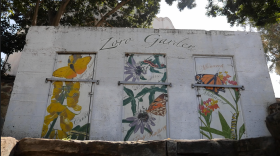Samuel Morales admits he applied to become a patrol officer in the San Diego Police Department after watching an episode of "Beach Patrol" on truTV.
"That's the place I want to work," Morales recalled saying in 2010, then a 20-year veteran of the New York City Police Department.
Three years later, Morales patrols the division that reminds him most of New York City's diverse boroughs: Mid-City. It's situated just south of Interstate 8 and stretches from North Park to La Mesa, meaning the only waves Morales sees on the job are those of immigrants — Vietnamese refugees who settled there in the '70s, Mexican immigrants who came in the '90s, then East Africans, Burmese and Cambodians.
And there's another similarity. Some of the neighborhood's predominantly minority residents said they believe Morales and his colleagues engage in racial profiling akin to New York City's controversial stop-and-frisk policy.
Morales, who's Latino and spent most of his childhood living in Section 8 housing in South Queens, said the seemingly nebulous traffic stops at the center of the racial profiling claims are key to protecting public safety.
"My concern is: Are the people genuinely being profiled or are they upset because they were stopped and think law enforcement had more important things to do?" Morales said. "This is important."
But there is genuine concern about discriminatory stops in the community. Abdihakim Afewerki, a 26-year-old student who often drives through City Heights and southeastern San Diego, told KPBS and Voice of San Diego he was pulled over by police 10 times last year. None of the stops left a mark on his record — a fact he said suggests the officers based their investigations on the color of his skin and tattoos. A detective sergeant on the police force, a city councilman and the head of the local NAACP all echoed Afewerki's concern.
Morales, however, said when he flips on his sirens, it has nothing to do with race. Traffic stops are one of the few forms of proactive policing he can do in a city where more people drive and in a department that's stretched thin.
"Community policing is great but we don't have the resources to get out there and walk. Vehicle stops are community policing," Morales said. "That's the tool the state has given me to do community policing."
He said pulling people over for broken taillights or dark window tinting — as long as the infraction actually exists — allows him to run their information and potentially take dangerous people, drugs and guns off the street. And though prying into a person's background could make him or her feel like they're being profiled, Morales said it's a necessary step.
"If he was 'America's Most Wanted' and I sent him away, I didn't do my job," Morales said. "If I have every legal right to find out who he is and all I do is write him a citation, that's no good. No bueno."
It's the same reasoning he uses to defend stop-and-frisk in New York.
"It turned the city around," he said, adding that gun crime eked up in the month following a federal judge's order to stop the practice. That ruling has since been stayed.
But The New York Times reports that crime trend was short-lived. By the end of 2013, New York City had achieved its lowest murder rate since 1963. Previous analyses showed most guns were found on people outside of stop-and-frisk zones and that the practice netted few serious criminals.
And criminal justice experts in San Diego and across the nation say addressing racial tensions between police and the community makes law enforcement easier. People in diverse communities are more likely to participate as witnesses and informants and voluntarily behave lawfully when they feel the law is applied equally.
Still, Mid-City Capt. Todd Jarvis said the routine stops are "how we catch murderers, dope dealers and all kinds of criminals." He said he has made it clear to his officers that those stops shouldn't violate a person's Constitutional rights, and that they should complete forms mandated by the department to track the racial trends.
Morales said it's common for him and other officers to skip the data form — it's one of several required for each stop and officers often lack time between calls. But he said neglecting to fill it out isn't an effort to hide something insidious.
"I don't think we have racists in the Police Department. I don't think a racist could be in the police department," Morales said. "If they really hate people, they wouldn't be able to do what we do because one way or another, you're going to have to help one of these people."









